Watermelon is a juicy and tasty fruit that everybody loves. It belongs to the same family as the cucumber, zucchini, and squash.
Watermelons are classified as both fruits and vegetables botanically. But does it mean our cute guinea pigs can consume watermelons?
Can guinea pigs eat watermelon? Guinea pigs can eat watermelon in a small serving size, once or twice a week only. Excessive consumption leads to digestive issues and other health problems. You can feed them the flesh and rind part but not the seeds, as they can pose a choking hazard to guinea pigs.
In the following sections, we will cover the things you need to know about watermelons and guinea pigs.
This includes the watermelon benefits for guinea pigs, nutritional content, possible health risks, and some quick facts about this refreshing juicy fruit. Let’s begin!
Table of Content
Is Watermelon Good for Guinea Pigs? | Health Benefits
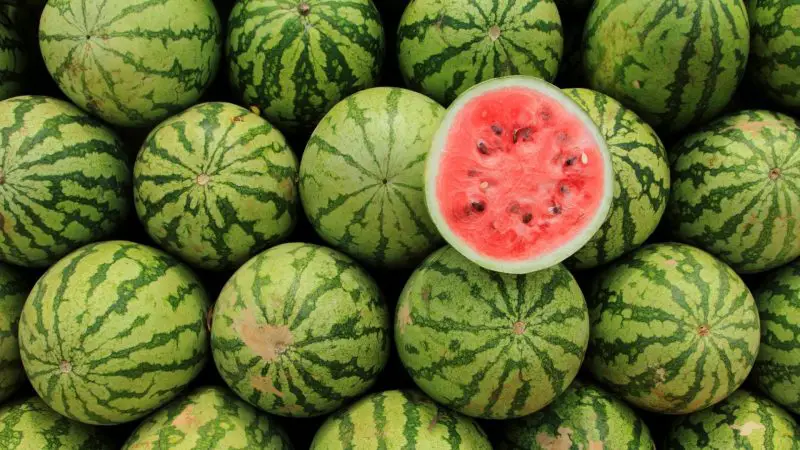
Sugar levels in the watermelon can affect the well-being of your guinea pig pet. For that reason, you can give your guinea pig watermelon as an occasional treat but not as regular food.
The fact that watermelon has high sugar levels does not imply that it lacks nutrients beneficial to your guinea pig. In essence, it has all the vital nutrients, including vitamin C, which is crucial to the health and well-being of guinea pigs.
Watermelons have plenty of health benefits for guinea pigs, such as the following:
Hydration
Apart from the water they drink, feeding them with watermelon will keep them well-hydrated. Watermelons are filled with sufficient high water that will help keep your cavy hydrated. At almost 92% of water content, they are among the most succulent fruits in the world.
Weight Management
With a high-water content, combined with enough dietary fiber, your pet can eat watermelon without getting huge amounts of calories.
Besides, fiber is a filler food, and it increases the satiety of your guinea pig. This way, your pet will be full and won’t overeat due to decreased appetite. All of this helps with weight control.
Helps Prevent Cancerous Growths
Compounds such as lycopene that are found in watermelons have positive benefits when it comes to cancer prevention. Lycopene is linked explicitly with preventing digestive-related cancer growths.
Improves Cardiovascular Health
Compounds in watermelon such as lycopene may help to lower blood pressure and cholesterol levels. These two are the most prominent causes of heart failure. Lycopene also reduces oxidative damage and the thickening of artery walls.
Citrulline is an amino acid found in watermelons that helps increase nitric oxide levels. Nitric oxide is beneficial for expanding blood vessels, which helps keep blood pressure at optimum levels.
Some other nutrients beneficial to the heart found in watermelons include potassium and magnesium.
Alleviates Inflammation
Otherwise known as swelling, inflammation is a body’s response to diseases and injuries.
When inflammation increases to chronic levels, it becomes dangerous to your guinea pig. Watermelons are rich in antioxidants that have anti-inflammatory properties. These are vitamin C and lycopene, reducing oxidative stress and preventing chronic inflammation.
Vision and Sight
Some nutrients in watermelons have significant benefits for guinea pig’s eye health. Lycopene, for instance, is useful to the eyes and helps to prevent diseases and infections. One of these diseases includes macular degeneration that often leads to blindness.
Vitamin C and Scurvy Prevention
Watermelons are very rich in vitamin C. This is an essential nutrient for guinea pigs as it helps to ward off diseases and, at the same time, keeps your guinea pig pet’s health intact.
Also, vitamin C aids in the absorption of iron into the body. Lastly, guinea pigs need to have vitamin C daily, and with the deficiency of this vitamin comes scurvy disease that is very dangerous for them. Luckily it can be prevented with a rich vitamin C diet for guinea pigs.
Helps to Improve Digestion
The presence of dietary fiber in watermelons helps to boost digestion.
Relieves Muscle Soreness
Although not a significant problem in guinea pigs, muscle soreness can lead to immense discomfort.
You can save your pet from this trouble by feeding it watermelons that contain citrulline. This is a compound that reduces pain and improves muscle movement.
Nutrition Facts of Watermelon for Guinea Pigs
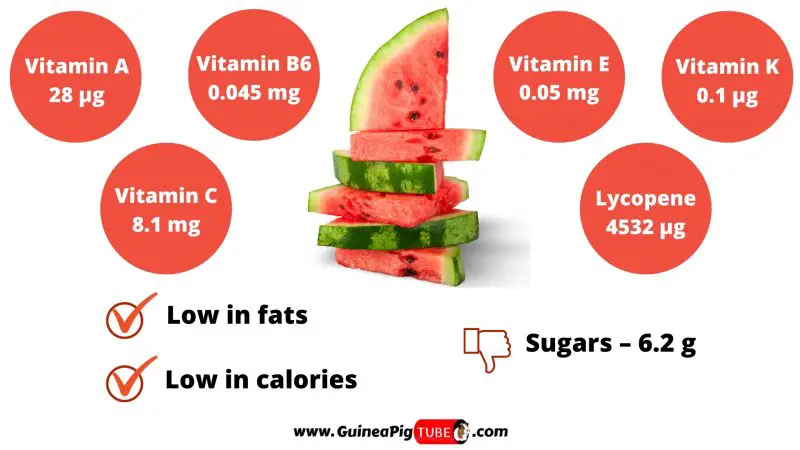
Several nutrients found in watermelons are beneficial to your guinea pig. Per 100 g of watermelon, these are the nutrition facts:
- Energy – 30 kcal
- Protein – 0.61 g
- Total Lipid (Fat) – 0.15 g
- Carbs – 7.55 g
- Dietary Fiber – 0.4 g
- Sugars – 6.2 g
- Calcium – 7 mg
- Iron – 0.24 mg
- Magnesium – 10 mg
- Phosphorus – 11 mg
- Potassium – 112 mg
- Sodium – 1 mg
- Vitamin C – 8.1 mg
- Vitamin B6 – 0.045 mg
- Vitamin A – 28 µg
- Vitamin E – 0.05 mg
- Vitamin K – 0.1 µg
- Folate – 3 µg
- Lycopene – 4532 µg
- Lutein + Zeaxanthin – 8 µg
This is a relatively low amount of calories and protein for a fruit. Luckily for guinea pigs, watermelons have a good amount of carbs and vitamin C, a vital nutrient for your pet’s well-being.
Vitamin A is also equally an essential vitamin as it is a potent antioxidant and plays other crucial roles in the body.
Is Watermelon Bad for Guinea Pigs? | Possible Risks
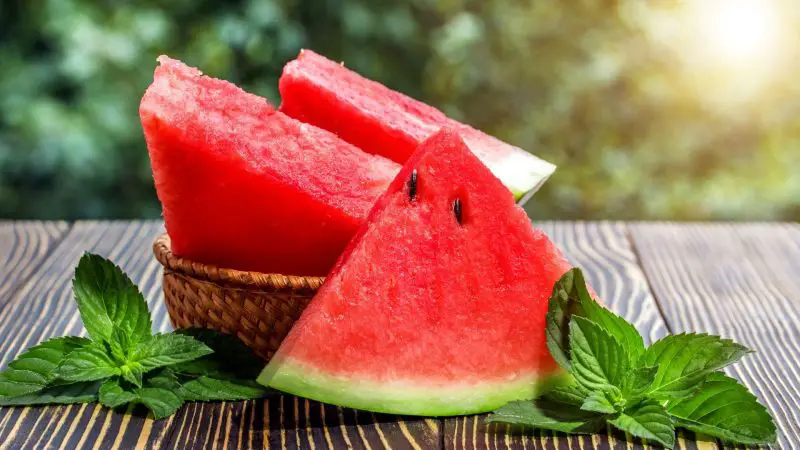
Watermelon can be bad for guinea pigs if excessively consumed. There are a few risks that your guinea pig could potentially encounter, such as the following:
High Sugar Levels
Watermelons are tasty, and that is why you won’t find it difficult to introduce them into a guinea pig’s diet. But high levels of sugar in watermelons are a possible health concern.
This is why you need to restrict the number of times you give watermelon to your pet. Once or twice a week is enough. Remember that guinea pigs are sensitive, and high sugar levels can cause diarrhea and an upset stomach.
Too Much Potassium
The potassium levels in watermelons are also high, and if your guinea pig has problems with kidneys, feeding it with this type of fruit can pose a dangerous threat to its health.
That’s because kidneys can’t remove the excess potassium if they don’t work well. This process can cause serious complications.
Serving Size and Frequency of Watermelon for Guinea Pigs
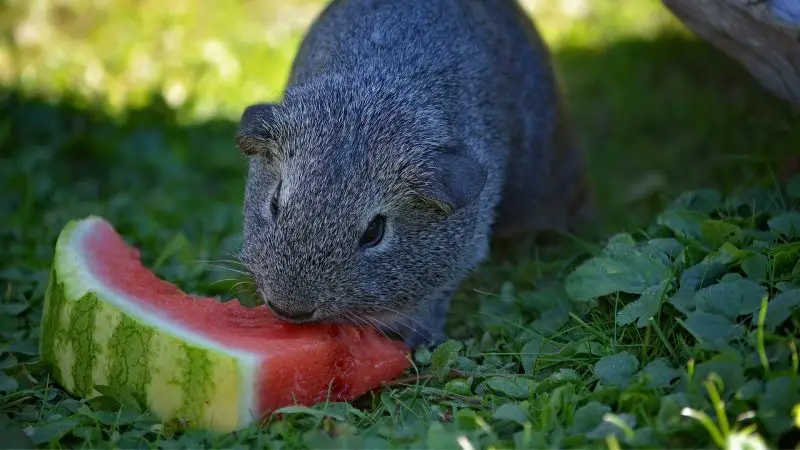
Can Guinea Pigs Have Watermelon Every Day?
Guinea pigs can’t eat watermelon every day because of the sugar content in this fruit.
They shouldn’t eat any fruit or vegetable every day in excess, and you need to make a proper schedule for every food you plan on giving them.
Guinea pigs can eat watermelon once or twice per week, but only in small serving sizes. Feeding them with watermelons every day can lead to many health problems in guinea pigs, like diabetes or obesity.
Can Guinea Pigs Eat Whole Watermelon?
Guinea pigs can’t eat the whole watermelon. It is too much for these little pets.
You can give them half a cup of watermelon sliced into small cubes. They will eat a lot of watermelons if you give them more because sometimes they don’t know when to stop eating, and watermelon is also very delicious for them. So, it’s very important to limit the portion sizes of watermelon before serving it to them.
More Information About Guinea Pigs and Watermelon
Do Guinea Pigs Like Watermelon?
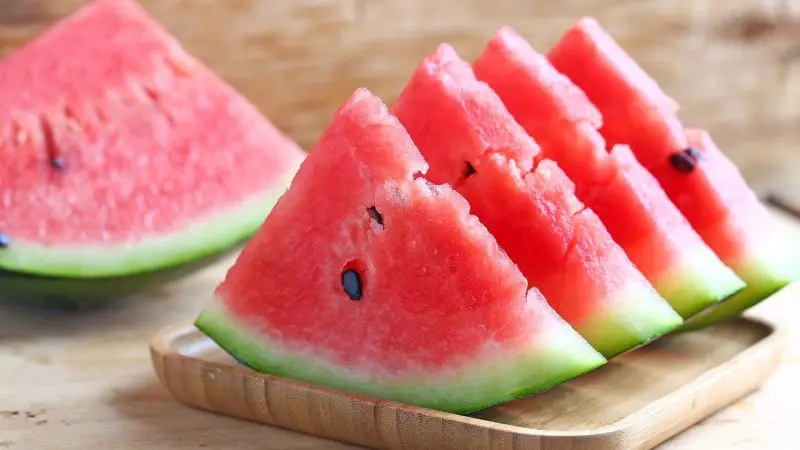
Guinea pigs like watermelons, as they taste good to them. Watermelon has a high water content that keeps the guinea pig’s body hydrated. Generally, they love to eat sweet fruits such as strawberries, apples, grapes, bananas, and many others.
Can Baby Guinea Pigs Eat Watermelon?
Baby guinea pigs can’t eat watermelon during the first few weeks of their life. During that period, they only need fresh hay, especially alfalfa hay, and water every day, and that’s an essential food for them.
After that period, they need some special vitamins and minerals from different fruits and vegetables. Lastly, after a few weeks of baby guinea pig’s period, you can introduce watermelon but only in small serving sizes and not every day.
Can Guinea Pigs Eat Watermelon Rind?
Guinea pigs can eat the watermelon rind, and that part is better for them because it contains less sugar than the red part.
Watermelon rinds or peels also contain vitamins and minerals that are good for guinea pig’s health, but you still have to be careful with the serving sizes. If your guinea pigs overeat watermelon rind, they can get diarrhea or digestive and stomach problems.
Also, it’s vital to wash the watermelon skin thoroughly due to the possibility of it having pesticides, which can be harmful to guinea pigs.
Can Guinea Pigs Eat Watermelon Seeds?
Guinea pigs can’t eat watermelon seeds, they are not poisonous, but they are big and can be a choking hazard. You need to remove all the black seeds from a watermelon before giving it to guinea pigs.
However, guinea pigs can eat white watermelon seeds because these seeds are smaller and soft. But it’s much safer if you remove all the watermelon seeds.
Can Guinea Pigs Eat Seedless Watermelon?
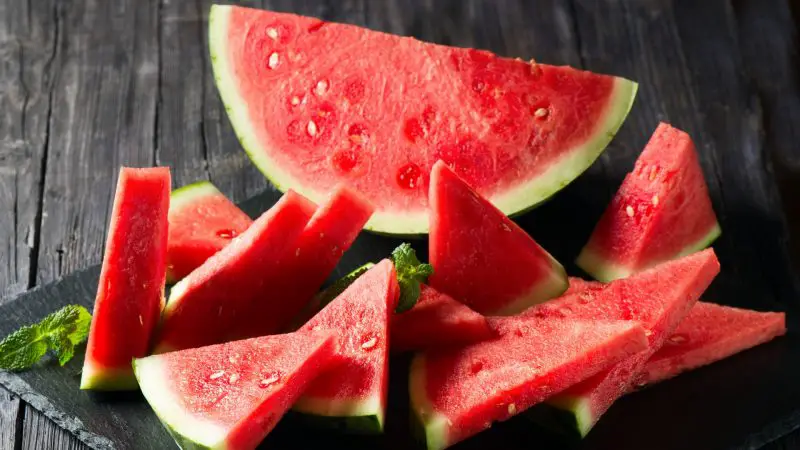
Guinea pigs can eat seedless watermelons because they are very similar to seeded watermelons in taste, sweetness, and texture. But these watermelons are not completely seedless.
They have white and soft seeds that aren’t harmful to guinea pigs. But it’s better if you remove all the seeds. Also, be careful with the serving sizes of seedless watermelons. They are also full of sugar, which can be bad for guinea pig’s health.
Can Guinea Pigs Eat Watermelon Leaves?
There isn’t much research that says if watermelon leaves are edible even for humans, so we can’t say if guinea pigs are allowed to eat watermelon leaves.
There are other leafy vegetables that guinea pigs enjoy, such as spinach, kale, romaine lettuce, and many others. So you don’t need to risk with the watermelon leaves. Just give them the red part and rind of the watermelon.
Can Guinea Pigs Drink Watermelon Juice?
Guinea pigs should not drink watermelon juice. This is highly risky, as it contains a high amount of sugar. It can cause digestive problems and even lead to illness, such as diabetes and obesity.
Can Guinea Pigs Eat Yellow Watermelon?
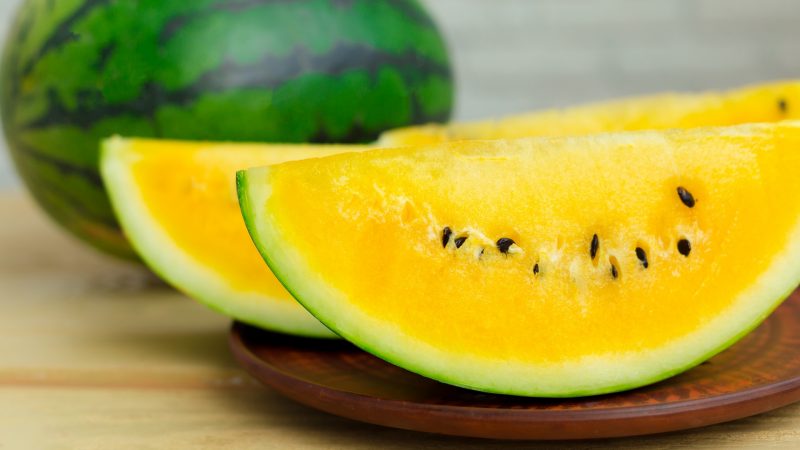
Guinea pigs can eat yellow watermelon, but only in moderation. This type of watermelon lacks lycopene, the pigment that gives red or pink color to fruits and vegetables, which is why it is yellow inside. Still, it has almost the same nutrients as the red/pink watermelon.
Yellow watermelon also contains vitamin C and vitamin A which are good for guinea pigs, but it can be sweeter than the red/pink one, so it’s not recommended to feed guinea pigs with this watermelon very often or in large serving sizes.
Quick Facts on Watermelon
These are some of the most interesting facts about watermelons:
- Watermelon is classified as both fruit and vegetable.
- They are called watermelons due to their 92% water content.
- There are 1200 distinct varieties of watermelons.
- Contrary to popular belief, seedless watermelons are not genetically engineered.
- The heaviest watermelon that entered the Guinness book of world records weighed 350.5 pounds.
- Farmers in Japan grow watermelons in different shapes.
- Watermelons are the official state vegetable of Oklahoma.
- They were kept in tombs of kings in ancient Egypt as a way of nourishing their souls.
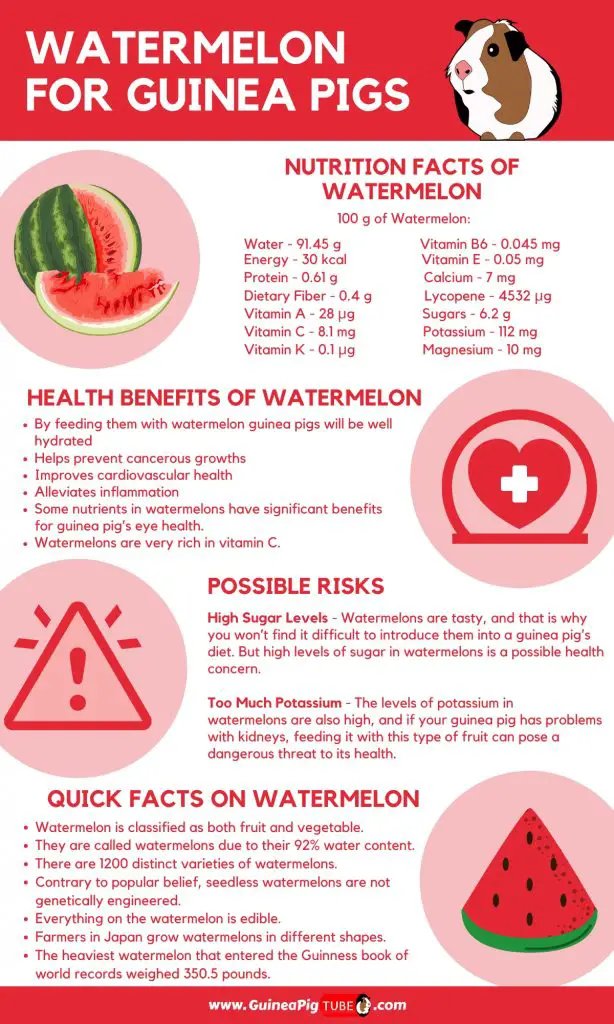
We have also made a full list of foods that guinea pigs can and can’t eat (150+ Types of Foods). Be sure to also check our recommended products page for everything you will ever need to assure a happy life for your guinea pigs. Hope this information was helpful and you have found the answer you were looking for.
List of Sources
Watch Your Garden Grow: Watermelon
Flesh Quality and Lycopene Stability of Fresh-Cut Watermelon
